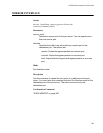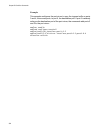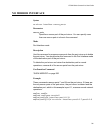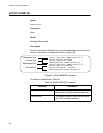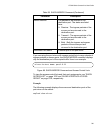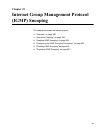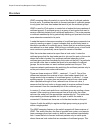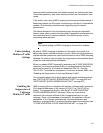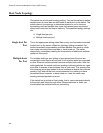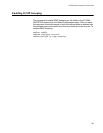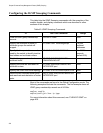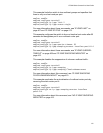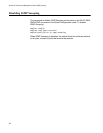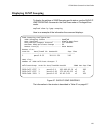
AT-9000 Switch Command Line User’s Guide
397
improves switch performance and network security by restricting the flow
of multicast packets to only those switch ports that are connected to host
nodes.
If the switch is not using IGMP snooping and receives multicast packets, it
floods the packets out all its ports, except the port on which it received the
packets. Such flooding of packets can negatively impact network
performance.
The switch maintains its list of multicast groups through an adjustable
timeout value, which controls how frequently it expects to see reports from
end nodes that want to remain members of multicast groups, and by
processing leave requests.
Note
The default setting for IGMP snooping on the switch is enabled.
Understanding
Multicast Traffic
Settings
By default, IGMP snooping is disabled on the switch. As a result, this
setting can impact multicast settings on a port. When you block egress or
ingress multicast packets on a port and the switch is set to IGMP snooping
disabled, the result is that all reports are suppressed on the specified ports
except for reserved multicast addresses.
When you enable IGMP Snooping by executing the IP IGMP SNOOPING
command, all unknown multicast traffic is unsuppressed and floods the
switch ports except for IPv4 reserved addresses 224.0.0.1 through
224.0.0.255. To enable the suppression of unknown multicast traffic, see
“Enabling the Suppression of Unknown Multicast Traffic”.
For information about how to block egress and ingress multicast packets,
see “SWITCHPORT BLOCK EGRESS-MULTICAST” on page 422 and
“SWITCHPORT BLOCK INGRESS-MULTICAST” on page 423.
Enabling the
Suppression of
Unknown
Multicast Traffic
IGMP snooping does not suppress all unknown multicast traffic except for
IPv4 reserved addresses in the range of 224.0.0.1 to 224.0.0.255 by
default. To suppress the flooding, use the NO IP IGMP SNOOPING
FLOOD-UNKNOWN-MCAST command. When you execute this
command, all unknown multicast traffic is suppressed prior to a join
message. Once a join message is accepted for the specified multicast
destination, it is no longer considered an unknown destination and,
therefore, no longer floods. For more information about this command, see
“IP IGMP SNOOPING FLOOD-UNKNOWN-MCAST” on page 410.



